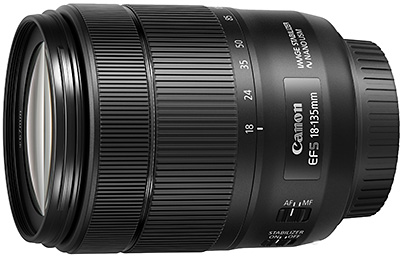EOS 80D Test Shoot Review: Subject Tracking Performance during Movie Shooting
The EOS 80D is a mid-range model that lets you take both still images and movies all on the same camera. Follow me in this article as I share my first impressions of its movie shooting capabilities, which can be said to be on par with that of a video camera thanks to its improved AF capabilities. (Edited by: Video Salon)

Newly developed lens system for movie shooting
As Canon’s new mid-range EOS DSLR, the EOS 80D comes equipped with Dual Pixel CMOS AF, which enables smooth AF and subject tracking during movie shooting. Full HD 50p/60p is supported, and the AF is compatible with all EF STM lenses.
The EF-S18-135mm f/3.5-5.6 IS USM has also been launched in conjunction with the release of the EOS 80D. This new zoom lens comes equipped with cutting-edge technology such as a stepping motor (STM), which achieves smooth and quiet movie AF, as well as the new Nano ultrasonic motor (USM) technology that realises AF at high speeds during still image shooting. Furthermore, the lens is also compatible with the electrically-driven Power Zoom Adapter PZ-E1. With all these, it is clear that the lens has been designed with movie shooting in mind.

The new EF-S18-135mm f/3.5-5.6 IS USM is equipped with the newly-developed Nano USM technology for high-speed, near-silent and smooth AF. AF is up to 4.3 times faster at the telephoto end compared to previous models.

The Power Zoom Adapter PZ-E1 designed for the EF-S18-135mm f/3.5-5.6 IS USM. It comes with electrically-driven zoom, 10 different levels of zoom speed, and can be controlled remotely on smartphones with a dedicated app. Powered by 4 AAA batteries.

Canon’s newly launched Directional Stereo Microphone DM-E1, designed to be mounted on a camera, features a durable shock mount construction and comes with a wind screen. Directivity: 90°/120°
First Impressions
DSLR movies on par with that of video cameras
The unique feature of the EOS 80D lies in its improved AF performance that lets you track a subject closely even during movie shooting. Phase-difference AF is used to capture quick movements when taking photos, but in Live View shooting, which used contrast AF, there were issues with lag. The dual pixel sensor was developed in answer to this, and its effect has been verified in the EOS 70D and EOS 7D Mark II.
With the EOS 80D, Movie Servo AF is also compatible with all EF lenses, allowing for continuous subject tracking with the AF. Photographers will probably find themselves having an easier time shooting as the EOS 80D’s AF can track even small birds, which are harder to track than bigger subjects like swans. This can be seen as a groundbreaking achievement that will finally put DSLR movies on par with those taken by a video camera.
There might be numerous cameras in the market claiming to be capable of capturing still images and movies equally well, but they all tend to be better at one or the other. However, I am confident that the EOS 80D is the one camera that can finally do both. (text: Yasushi Sugawara)


Both the swan and kingfisher shots are frames extracted from a HD movie. Although the shots were shot in direct backlight, a wide image with dynamic range can still be taken due to the allowance afforded by the APS-C sized sensor.
Touch screen operations are great for movie shooting

As the control dial has some resistance when turning, operating it during movie shooting can lead to camera shake. A capactive touch screen helps keep vibrations to a minimum. A good idea would be to master the dial operations steadily and speedily before shooting, and then use the touch screen when shooting. Operations free of camera shake are possible even with a 1600 mm telephoto lens
Reliable AF even for DSLR movies

The AF area selection mode screen (left); Movie Servo AF paused (right)
HDR functions even for movie shooting

Although a HDR (High Dynamic Range) can easily be achieved for still images by combining them, the effect is harder to achieve for movies. The EOS 80D has a HDR Movie shooting function for backlight control that suppresses bright areas, which I found more useful than the usual HDR effects.
(Above: The screen in HDR Movie mode)
Improved time lapse function

Although still time-lapse shots are generally stored as photos, Time-Lapse Movie joins your photos into movies and saves you the effort of processing the pictures on a PC.
*The camera used in this article is a prototype made in Japan. As a result, please note that the results may differ from the actual product in terms of the external appearance, image quality, etc.
SPECIFICATIONS
Mount:
Canon EF mount
Recording media:
SD/SDHC/SDXC
Image sensor:
APS-C sized, approx. 24.2 megapixels (equipped with Dual Pixel CMOS AF)
ISO speed:
Normal ISO 100-16000 (Expansion 25600)
Continuous shooting speed:
Approx. 7 shots/sec (high-speed);
Approx. 3 shots/sec (low-speed)
Approx. 3 shots/sec (silent shooting mode)
Movie recording format:
Full HD MOV/MP4:MPEG4 AVC/H.264 (ALL-I only when shooting MOV)
Maximum video quality/frame rate:
Approx. 90Mbps for Full HD MOV (1920×1080) 50p/60p ALL-I; approx. 60Mbps for Full HD MP4 (1920×1080) 50p/60p
Maximum recording time per clip:
Approx. 29 min 59 sec
HDR Movie Shooting:
Full HD
Movie digital zoom:
Approx. 3x – 10x
Battery:
LP-E6N, LP-E6
Time code:
Allowed (Rec Run/Free Run selectable, drop frame/non-drop frame selectable)
LCD Monitor:
Vari-angle, touch screen
Wi-Fi:
Built-in (NFC compatible)

EOS 80D Kit II (EF-S18-135mm IS USM)

Yasushi Sugawara
Takes photographs of all sorts of living things, including birds, insects and plants, using special techniques such as time lapse, high speeds and three dimensional photography. Provides footage for TV, creates footage for exhibitions, writes for magazines and is active in many other areas. Member of the Society of Scientific Photography. Award recipient, EARTH VISION Global Environmental Film Festival (2000). Award recipient, Japan Wildlife Film Festival (2001).

Video Salon
Video Salon started publication in 1980, and is Japan’s only niche magazine on videographic equipment. Catering to readers who range from serious amateurs to professionals, it enjoys an established reputation not only for the information it provides on video cameras and editing software, but also on its drive-run reviews on videography with the latest DSLR cameras and its expert tips and tutorials.
Published by GENKOSHA Co., Ltd

































